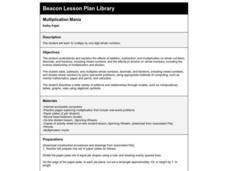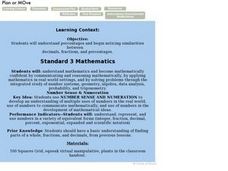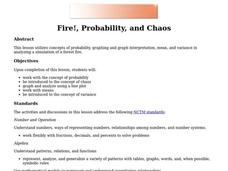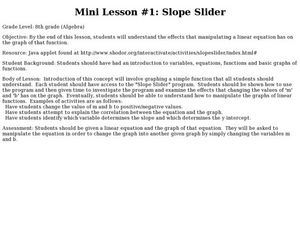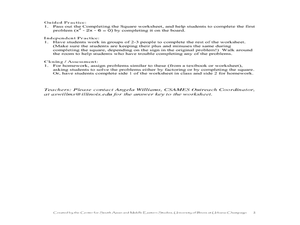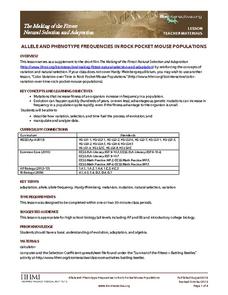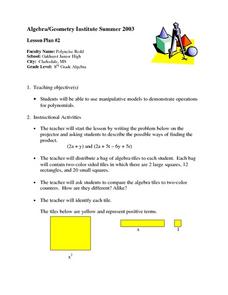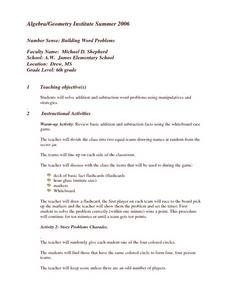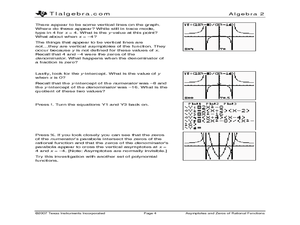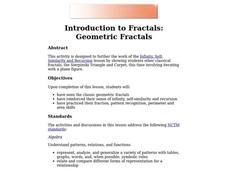Robert Gordon University
Indices
The laws of exponents are written on a handy reference sheet. Note that since this worksheet was written in the UK, powers or exponents are also called indices (singular: index). If this does not pose a problem for you, the concepts and...
Curated OER
Plan or Move
Middle schoolers note the similarities between decimals, fractions and percentages. They practice converting numbers between these types. They participate in an activity as well.
Curated OER
Fire!, Probability, and Chaos
Upper elementary and middle schoolers work with the concept of probability. They are introduced to the concept of chaos. Learners graph and analyze using a line plot, work with mean, and are introduced to the concept of variance.
Curated OER
Box Plots
Young statisticians are introduced to box plots and quartiles. They use an activity and discussion with supplemental exercises to help them explore how data can be graphically represented.
Utah Education Network (UEN)
Linear Relationships: Tables, Equations, and Graphs
Pupils explore the concept of linear relationships. They discuss real-world examples of independent and dependent relationships. In addition, they use tables, graphs, and equations to represent linear relationships. They also use ordered...
Curated OER
Properties of Equality
What assumptions are made in order to solve equations? An instructional slideshow provides an overview and guided examples of how properties of equality can be used to justify each step in solving equations.
Alabama Learning Exchange
Explore the Transformations of Linear and Absolute Value Functions Using Graphing Utilities
Learners explore the concept of transformations. For this transformation activity, students use an applet that is an interactive absolute value graph applet. Learners manipulate the applet to examine the change in the...
Curated OER
Mine Lesson #1: Slope slider
Eighth graders investigate linear equations. In this Algebra I lesson, 8th graders explore the effects that manipulating a linear equation has on the graph of the function through the use of a java applet.
Curated OER
Perimeters, Patterns, and Conjectures
Young scholars discover patterns and write conjectures relating to perimeters and polygons. Working in cooperative learning groups, they use manipulatives and graphic organizers to solve problems then answer a series of questions in...
Curated OER
Completing the Square Lesson Plan
Learners investigate the origin of the quadratic function. In this algebra lesson plan, students analyze solving an equation by completing the square. They compare the early methods as compared to our method for solving quadratics.
Curated OER
Rules of Sign Change
Students manipulate negative and positive numbers. In this integers lesson, students move through three activities exploring negative and positive whole numbers. A number line, cardboard function representation, and solving expressions...
Curated OER
The Truth About Triangles and Squares
Fourth graders investigate the patterns associated with both triangular and square numbers. They use counters as manipulatives to depict the numbers as needed but focus on problem solving using mental math techniques.
Curated OER
"Ball Bounce" Quadratic Functions
Young scholars manipulate a ball and explore quadratic functions. In this algebra instructional activity, learners analyze the graph of a quadratic function. They identify quadratic properties.
Curated OER
Symmetry: Theory, Reality and Art!
Students explore the concept of geometric symmetry. In this geometric symmetry lesson, students walk around their school and take pictures of objects that demonstrate symmetry. Students use Microsoft Paint to draw the lines of symmetry...
Curated OER
Discovering the Mathematics of Sound
Students study the basic skills of algebraic manipulations. They practice the application of basic mathematics in science and determine the nature of good acoustics. They develop proposals for providing good acoustics and identify...
Curated OER
Allele and Phenotype Frequencies in Rock Pocket Mouse Populations
In the deserts of Arizona and New Mexico, some tiny creatures show just how quickly natural selection can turn a mutation into an advantageous adaptation. Watch a video about rock pocket mice, who show that one small change can make all...
Curated OER
Operations For Polynomials
Eighth graders investigate how to combine polynomials using different operations. The use of tiles is done in order to accommodate those who are kinesthetic learners. The sequencing of the activity is easy to follow.
Curated OER
From Playing with Electronics to Data Analysis
Learners collect and Analyze data. For this statistics lesson, students identify the line of best fit of the graph. They classify lines as having positive, negative and no correlation.
Curated OER
Building Word Problems
Sixth graders study addition and subtraction facts. In equal groups, they play a race game to correctly solve addition and subtraction problems. Using a PowerPoint presentation, the teacher demonstrates how to write word problems and...
Curated OER
Asymptotes and Zeros
Learn how to explore rational functions and investigate the graphs rational functions and identify its singularities and asymptotes. Students approximate the solutions to rational equations and inequalities by graphing.
Curated OER
Quick Stats with Quick Poll
Learners analyze data using bar graphs and the TI in this statistics lesson. They investigate quick polls and graph the data using different properties of statistics. This assignment requires a TI Navigator.
Curated OER
Graphing Linear Equations
Ninth graders develop an understanding of and the applications for linear equations and their graphical displays. They participate in a cooperative learning activity of matching a graphic display with an equation.
Curated OER
Introduction to Fractals: Geometric Fractals
Learners study and observe the patterns made by the areas of the Sierpinski Triangle. Students use the computer to draw two or three iterations to discover the number patterns. Learners complete worksheets based on Geometric Fractals.

